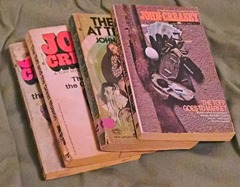 Can an author be “too” prolific? That’s the thesis that an opinion piece in the New York Times examines. Looking at authors like John Creasey, Ursula Bloom, Barbara Cartland, and even Agatha Christie, the author of the piece muses on the possible connection between level of output and quality. Do authors who turn out hundreds of novels in their lifetime write schlock?
Can an author be “too” prolific? That’s the thesis that an opinion piece in the New York Times examines. Looking at authors like John Creasey, Ursula Bloom, Barbara Cartland, and even Agatha Christie, the author of the piece muses on the possible connection between level of output and quality. Do authors who turn out hundreds of novels in their lifetime write schlock?
It’s a good question, though the examination is perhaps rendered a little unintentionally laughable by the fact that the author of the piece is none other than Stephen King. King is one of the foremost names in the horror genre, and rightly so—when he is at the top of his gang, he is fantastic. But since he effectively got too big to edit later in his career, King has nonetheless also become known for turning out badly-edited bookstoppers, sometimes more than one of them in a year.
King himself is not unaware of the irony, but he offers the excuse that he was simply too driven not to write, and suggests that other prolific writers like Max Brand and Isaac Asimov—who certainly few would accuse of lacking in quality—were the same way.
The biggest thing I would add to King’s comments is that taste is necessarily subjective. I’ve read works by some of the authors King pooh-poohs, such as Creasey (in fact, I took four of his books down from my shelf to photograph for this story), and enjoyed them immensely. How does he know that those writers he looks down on didn’t feel the same? Furthermore, if Creasey wasn’t a good writer, and enjoyed by his readers, would he have been able to sell the 500+ novels he turned out in his career? Really, it’s kind of rich that King has room to look down on anyone.
































Stephen King is mistaken when he confuses writing quickly with writing badly. My drafts are typically awful, so I have to edit and edit to get them to something I’m not ashamed of. Others aren’t that way, they can write quickly and well. They are the fortunate ones.
For an illustration of the latter, read what some describe as Ronald Reagan’s “last letter to America” just after he discovered he had Alzheimer’s.
http://reagan.wingslikeaneagle.com/11.05.94_alzheimers.html
Few could have said what he said as well as he did, even after numerous drafts. And yet according to his wife, that letter as published was almost identical to his original draft.
—-
I make a different distinction. Success can be achieved by writing what you readers WANT to hear, appealing to their stereotypes, prejudices and distorted views of the world. Once the various techniques are learned, books can be turned out quickly. Quite a few romance novels and thrillers are written that way. They’re not only predicable, readers like them because they’re predictable.
Opposing that are books that tell readers what they NEED to hear. Sometimes, if the time is right, they’ll listen, and the book will become popular because it causes people to change. If the time is not right though, they languish.
—-
Harper Lee’s two novels illustrate that. Her first attempt, Go Set a Watchman, told readers what they wanted to hear in the mid to late 1950s, that entrenched attitudes in the South meant that integration needed to move more slowly. Justice needed to be delayed.
Lee’s later attempt and first published novel, To Kill a Mockingbird, took the opposite approach. It told readers what they needed to hear, that segregation was bad not just for blacks but for everyone in the South. It came out at just the right time. If it’d come out five years earlier, it might not have done as well.
Yes, I’m taking good in a different sense, that of being good for their readers while at the same time hopefully being well-written . Lee’s Watchman did poorly on both. Her Mockingbird did marvelously on both.
—-
For a writer, that moment when a book should be published for maximum effect may brief, coming between when no one will listen and when it’s merely another ‘me too’ title. As Brutus notes in Act 4 and Shakespeare’s Julius Caesar:
There is a tide in the affairs of men.
Which, taken at the flood, leads on to fortune;
Omitted, all the voyage of their life
Is bound in shallows and in miseries.
–Mike Perry, Inkling Books
When I was at University in the 80s, my Junior year English composition professor (who won a National Book Award in History in the 70s) said that most authors don’t know when to quit, so many write more than they should: this from a man who only wrote one book, go figure. E.M. Foster was his example for an author who didn’t write too much.
King is a good example of an author who writes too much. Up until the early 90s, I read all his books when the came out, but I pretty much wanted to stop with Needful Things, saying to myself this a a stupid story. I forged on for a few more out of habit, picked an occasional book from his late career, but I could not care less what he does now. My reading preferences have moved on.
Of course, authors who don’t make a boat loads of money with their novels have to write more if they want to pay the light bill and kid’s university education. Hence, so many writing never ending series. It’s really almost like any other day job at that point – which makes for “worse” writing.
Isn’t this, in essence, saying that practicing the craft less is somehow supposed to yield better results? Don’t we normally get better by doing, and doing a lot?